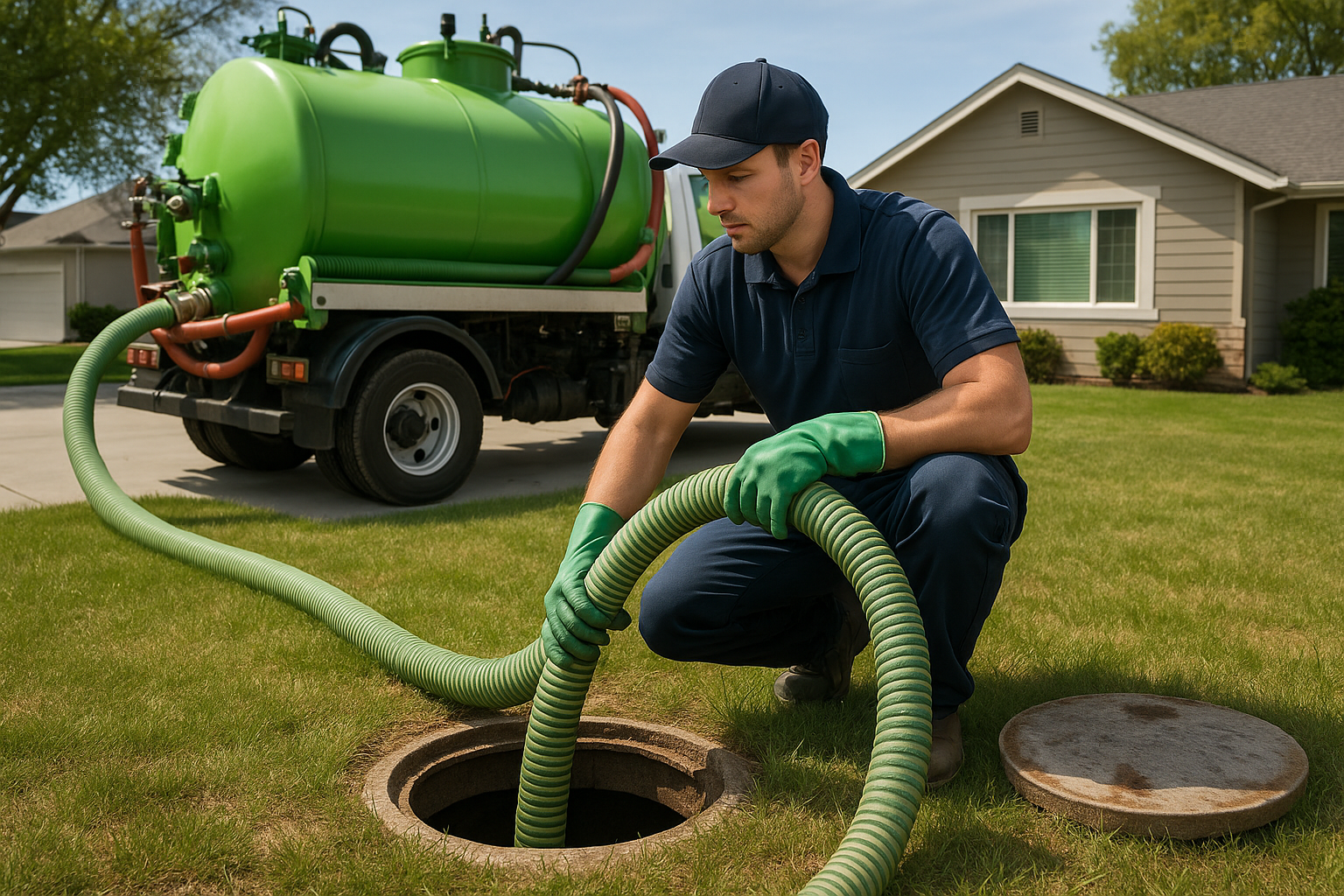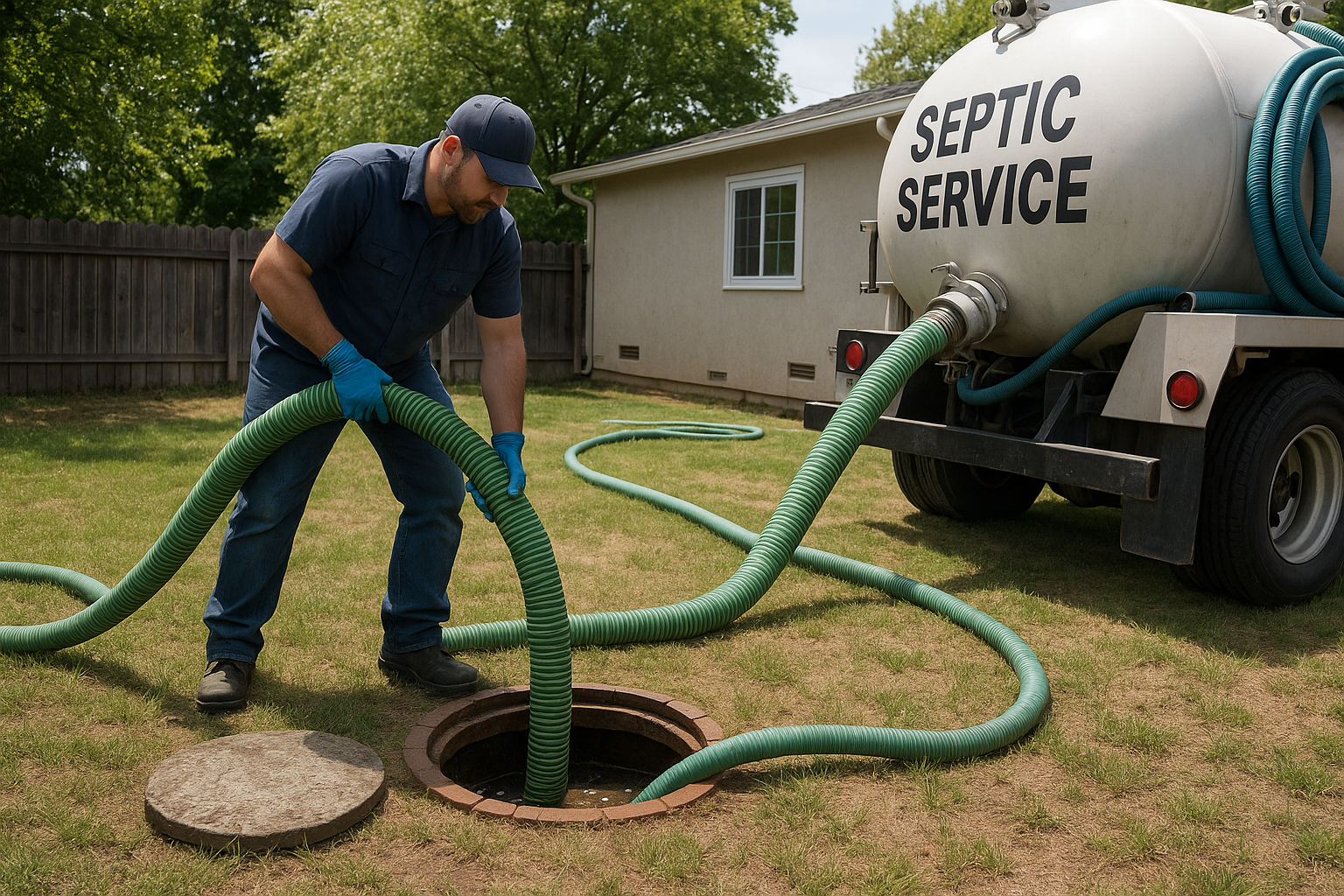A septic system is the hidden workhorse of your home’s plumbing, quietly managing all the wastewater from toilets, sinks, and showers. Unlike a city sewer, your septic tank and system treat wastewater right on your property, using natural bacteria to break down solids and safely release treated water back into the ground. This process keeps your home clean and your yard safe if the system is properly maintained.
Routine maintenance, especially regular septic tank pumping, is essential to keep your septic system running smoothly. Without it, solids can build up in the tank, leading to septic issues like gurgling sounds in your sinks, slow drains, sewage backups, and even wet spots in your yard. Ignoring these warning signs can make septic problems much worse, potentially causing expensive repairs, environmental harm, and health hazards for your family.
Staying on top of septic maintenance means scheduling septic tank pumping every few years, watching for signs like slow drains or foul odors, and responding quickly if you notice anything unusual. A well-cared-for septic system can last for decades, but neglecting regular maintenance can lead to bigger problems down the road. Protect your home, your property, and your peace of mind by keeping your septic system in top shape.
What Is Emergency Septic Pumping and When Do You Need It?
Emergency septic pumping is a same-day or 24 hour septic service to remove sewage and relieve pressure when tanks or lines back up. Our team is ready to respond quickly to emergencies. Call immediately if drains gurgle, toilets overflow, or sewage surfaces in the yard. Fast pumping protects your home, prevents health risks, and buys time for repairs.
Signs You Need Fast Septic Help
Backups rarely start all at once. They whisper first.
Red Flags Inside The House:
- Slow drains in sinks, tubs, or showers
- Gurgling sounds from plumbing
- Foul odors coming from drains
- Water pooling around floor drains
- Toilets that are slow to flush or don’t flush completely
- Sewage backing up into sinks, tubs, or toilets a sign of a serious problem
Warning Signs In The Yard:
- Wet, soggy, or unusually green patches of grass
- Foul sewage odors outside
- Standing water near the septic tank or drain field
- Tanks or lines overflowing, with visible spills or flooding a visible emergency
Blockages in the septic system can cause these symptoms, including slow drains, sewage backing, and overflowing, and should be addressed immediately to prevent severe damage or health hazards.
Red Flags Inside The House
- Gurgling sinks or tubs after flushing.
- Slow drains in more than one fixture at the same time.
- Water at the floor drain or tub after laundry.
- Toilet bubbles or a faint sewage odor.
Warning Signs In The Yard
- Wet, spongy lawn above the tank or lines.
- Grass patches that are bright green even in dry weeks.
- Visible scum near the tank lid.
Watch-out: If sewage is in the tub or backing through floor drains, treat it as an emergency septic tank pumping situation and keep kids and pets away from affected areas.
What Emergency Septic Pumping Includes
A septic tank emergency requires immediate action to prevent health hazards and property damage. Blue Ribbon Septic focuses on speed and safety.
Rapid Assessment And Safe Setup
When you call, a technician arrives quickly to assess the situation. They check for signs of overflow, backups, and system failure. As part of the assessment, the technician will also inspect the septic pump to ensure it is functioning properly. The area is secured to prevent contamination and further damage.
Pump-Out, Clearing, And Basic Fixes
The technician uses a vacuum truck to pump out the tank, removing waste and relieving pressure on the system. It’s important to have your system pumped regularly to avoid backups and costly repairs. After the pump-out, the technician clears blockages and checks for obvious damage. Getting your tank pumped on schedule helps maintain a healthy, efficient septic system and prevents future issues.
Pro tip: Having your septic tank pumped is a key part of maintenance. Don't wait for an emergency to schedule service.
Getting your septic tank pumped, system pumped, and tank pumped are all essential steps in both emergency and routine septic maintenance.
Rapid Assessment And Safe Setup
- Confirm tank location and access.
- Vent hoses and place spill trays.
- Check liquid level to confirm a septic tank pumping emergency.
Pump-Out, Clearing, And Basic Fixes
- Pump solids and liquids fully
- Rinse and recheck baffles.
- Clear inlet clogs when reachable.
- Provide a simple map and notes so repairs are easy to plan.
Pro tip: Ask your tech to show you the scum and sludge depth after pumping. It helps set a realistic schedule, even if you needed 24 7 septic pumping today.
Emergency Septic Pumping Cost In Sacramento
Costs can vary by tank size, access, and time of day. Typical ranges for Sacramento homes:
- Standard daytime pump-out: often similar to routine service, with a small urgent fee.
- After-hours or holiday: higher travel and staffing rates.
- Extra time for heavy solids, difficult access, or frozen lids may add cost.
Pro tip: Ask for a clear price up front. Blue Ribbon Septic provides transparent emergency septic pumping cost estimates before work starts.
Step-By-Step: What To Do Before The Truck Arrives
- Stop water use at once. Pause laundry and dishwashers. Short, essential handwashing only.
- Shut off water to leaky fixtures. A trickling flapper can flood a system.
- Ventilate rooms with odor.
- Protect floors near drains with towels and a tray.
- Locate lids if you know where they are. Do not dig blindly.
- Keep people and pets away from wet soil or standing water.
- Note recent changes: guests, big laundry days, new garbage disposal, or heavy rain. Share this with your tech.
If you are comfortable adding basic maintenance later, consider upgrading to septic risers and lids so future septic tank pumping services are faster and cleaner.
Common Causes Of Septic Tank Pumping Emergency
Heavy Use, Guests, And Big Water Loads
Large loads can overwhelm tanks and soak drain fields, especially when routine maintenance is overdue.
Clogs, Roots, And Broken Parts
Grease, wipes, and feminine products create stubborn plugs. Tree roots and broken baffles push solids into the field, leading to an emergency septic tank pumping near me at the worst time.
Watch-out: If you hear gurgling plus smell sewage outdoors, call for 24 hour septic tank service. Noise plus odor often means the tank is full and pressure is rising.
Fix Now Or Schedule Later: Pumping Versus Repair
- Pumping is the fastest way to stop backups and make your home safe.
- Repairs fix the cause. Examples: replace a broken baffle, jet a clogged line, or repair a crushed pipe
- Upgrades like risers, filters, or rerouted lines reduce future risk.
Simple rule: Use emergency septic pumping to relieve pressure today, then schedule inspection and targeted repair within 3 to 7 days.
Drain Field and Leach Field Care During Emergencies
Stop all water use immediately to avoid flooding the system and overwhelming the drain field/leach field.
What to Avoid
- Do not walk on or disturb wet/soggy areas in the yard
- Avoid spreading contamination or making repairs more difficult
Call the Pros—Fast
- Contact a professional septic services team right away
- Techs assess, provide solutions, and begin repairs/cleaning as needed
- May recommend septic tank pumping, drain cleaning, or temporary repairs to protect your property and family
Prevention Still Wins
- Regular maintenance, including routine pumping and professional drain cleaning, helps prevent emergencies
- If a crisis occurs, quick action + expert services minimize damage so your system continues to treat wastewater efficiently
Bottom line: Respond fast and trust professionals to protect your drain/leach field, your home, and your investment.
Pro Tips To Prevent The Next Emergency
- Set a realistic schedule. Most homes pump every 3 to 5 years; heavy use may need sooner.
- Use a lint trap on the washer hose to keep fibers out
- Divert roof drains away from the field.
- Install a filter at the outlet if your tank can accept one.
- Add septic tank riser installation now to make inspections and septic riser installation checks easy.
- Keep a simple log of dates, guests, and issues.
Pro tip: If you host often, plan a courtesy check before big events. It is cheaper than a midnight call for 24 hour septic help.
When To Choose 24 7 Septic Pumping Versus Next-Day Service
Choose 24 7 septic pumping when:
- Sewage is backing into tubs or floor drains.
- The yard is wet or smells strongly of sewage.
- Only one bathroom works and you have young kids or guests.
Choose next-day when:
- One fixture is slow but others work.
- No sewage is visible and odors are mild.
- You can pause water use and wait for a morning appointment.
Stop The Backup, Protect Your Home
Blue Ribbon Septic treats every urgent call as a safety issue. You get fast arrival, careful setup, clean pump-out, and clear notes so repairs are simple. Whether you need emergency septic pumping right now or want a prevention plan for the season, we will guide you step by step.
Next Steps To Stay Safe And Save Money
- Book an urgent visit if sewage is visible or multiple drains fail.
- Ask for a price quote that covers tank size, access, and timing.
- Plan a short follow-up visit for inspection and repairs.
- Add a riser kit so future service is quick and clean.
- Start a simple log and pump on schedule.
If You Need Help Now
Blue Ribbon Septic is ready with same-day relief, tidy work, and a prevention roadmap. Call today for Sacramento-area homes and get your home back to normal fast.
FAQ Section — Fast Answers For Homeowners
Q1. How fast can a crew arrive for emergency septic pumping?
In many Sacramento areas, response can be same-day. If sewage is backing up, request 24 hour septic service and minimize water use until arrival.
Q2. What should I do if sewage backs into the tub?
Stop all water use, keep kids and pets away, ventilate the room, and call for emergency septic tank pumping. Do not use chemical drain openers.
Q3. Will emergency pumping fix the root problem?
It relieves pressure and restores use. Your tech will recommend repairs such as clearing clogs, replacing baffles, or jetting lines after the pump-out.
Q4. How often should I pump after this emergency?
Most homes pump every 3 to 5 years. Heavy use, guests, or a small tank may shorten the cycle. Keep a simple log to track usage.
Q5. Is it safe to stay at home during a septic backup?
Yes, if affected areas are closed off and ventilated, and water use is stopped. If sewage is widespread indoors, consider temporary relocation until clean-up.
Q6. Can additives prevent future emergencies?
No additive replaces a full pump-out. Focus on regular maintenance, smart water use, and upgrades like septic riser lids and outlet filters.






